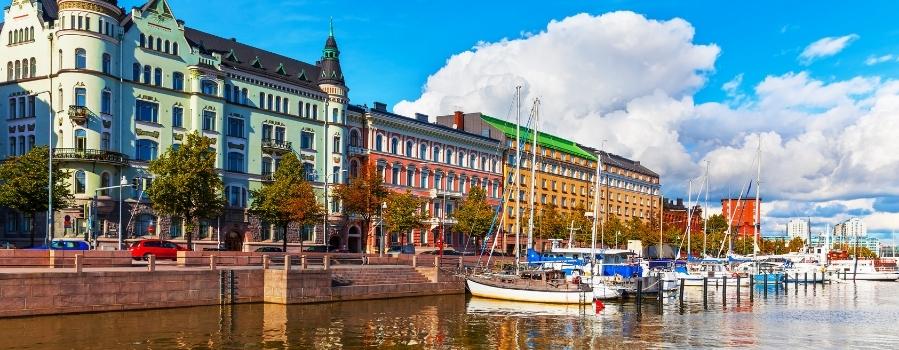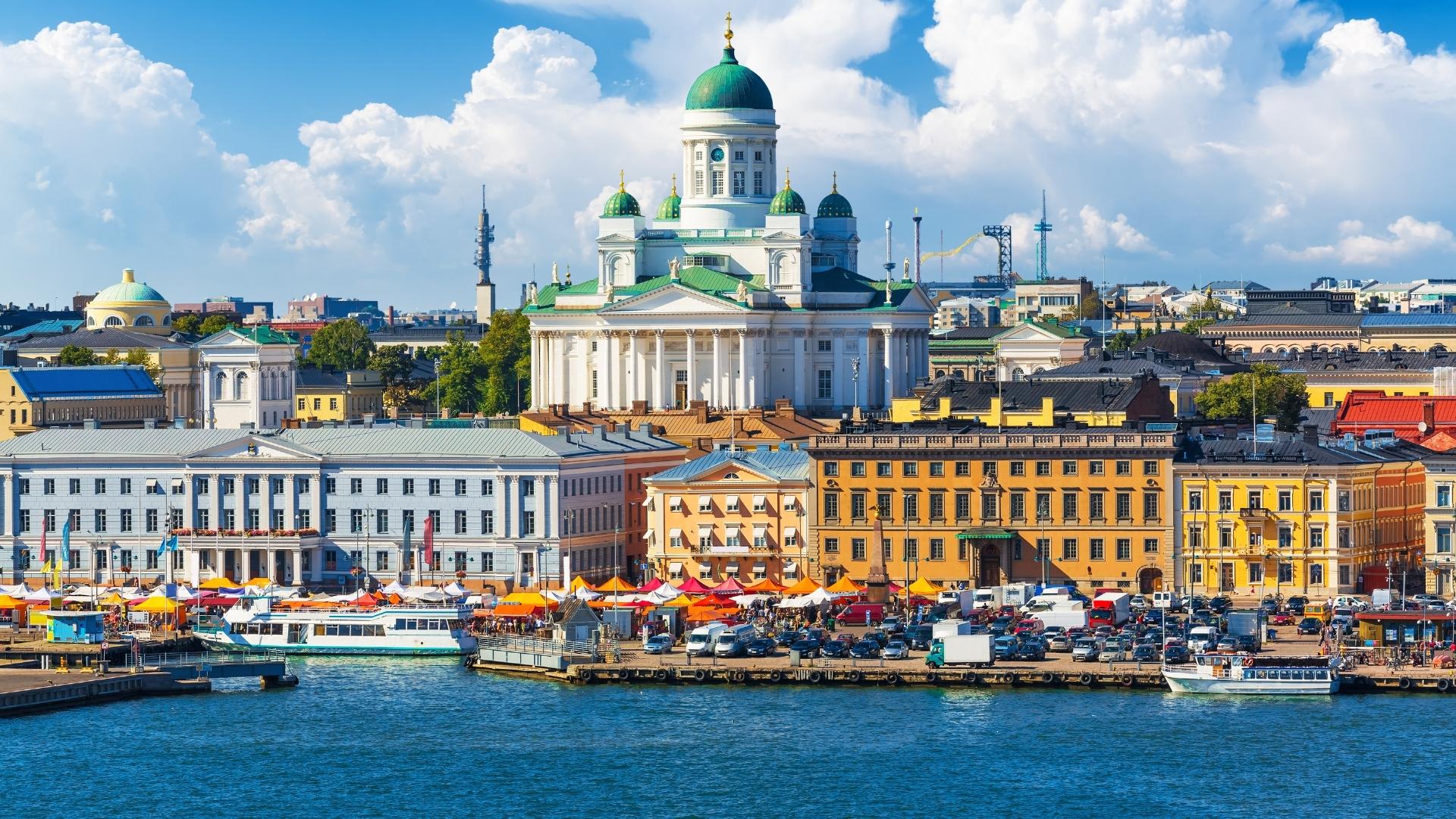- Population: 5.531 million
- Currency: Euro (EUR)
- University Students: 156,577
- International Students: 5.500
- English-taught Programs: 600
The Nordic countries, including Finland, are noted for their intellectual prowess and unique culture. Even if you’re seeking for a distinct Nordic experience while studying abroad, it’s also home to some of the best colleges in Europe today and has been awarded the world’s happiest country for 2019.
When it comes to Finland’s cultural expression, the country’s unusual geographic location, right between Western and Eastern Europe, with Sweden, Norway, and Russia as its neighbours, has had a major impact on the country’s cultural expression. Finland’s efficient operation is due to the large part to the country’s excellent leadership, social innovation, and practical solutions in business, industry, and people’s daily lives. Finnish natural beauty and terrain is unrivalled in the world because to its hard winters as well as its beautiful summers, making your trip unforgettable.
For students to be accepted into a university in any country, they must meet a set of admission requirements. The land of a thousand lakes, and the birthplace of Santa Claus are just a few of the things Finland is known for. Finland, on the other hand, is a forward-thinking nation with world-class institutions of higher learning.
OVERVIEW STUDY IN FINLAND

In Finland, there are plenty of study abroad options, from the seaside metropolis of Helsinki to the historic university town of Turku to the attractive inland city of Tampere. Finland has a world-renowned educational system and is regarded as one of Europe’s most recent and progressive nations. 20,000+ students are now studying in Finland, so if you’re looking for a world-class education while also experiencing the interesting Nordic culture in the happiest country on Earth, apply today. Finland’s higher education system is a popular choice for international students due to the country’s excellent public and private education and unique Nordic culture.
Finland has a unique allure for international students looking to further their education. The high-quality education, academic independence, and student-centred support services will be the best perks. According to the World Economic Forum’s Global Competitiveness Report, Finland is ranked as one of the most innovative countries in terms of higher education and training programmes. It will be a pleasure for you pursuing a Bachelor’s degree in this Nordic country with such a prestigious reputation.
UNIVERSITIES IN FINLAND
- University of Helsinki
- Aalto University
- LUT University
- Tampere University
- University of Oulu
- University of Jyväskylä
- University of Turku
- University of Vaasa
- University of Eastern Finland
- Åbo Akademi University
The higher education system in Finland consists of universities and colleges of applied sciences (UAS). The universities are the only ones that provide doctoral programmes. There are 13 public universities in Finland, all of which are state-owned, and their primary concentration is on scientific research and a more theoretical education for students. Local municipalities and commercial groups administer UAS programmes that focus on practical skills training as well as industrial growth. Many nations in Europe utilise the European Credit Transfer System (ECTS) to quantify the number of credits earned in higher education, and this is the case in Finland as well.
There are three categories of degrees available in Finland’s higher education system:
An academic or a professional bachelor’s degree takes three years and 180 ECTS (European Credit Transfer System) credits to complete. The programme provides students with a solid foundation in their chosen field, as well as a broader education in general.
The doctorate degree is known as a Ph.D. In Finland, PhD studies typically take four years to complete. As a further option, a student may be able to contact the department of interest to inquire about available PhD programmes. Only universities can award PhDs.
Non-EU/EEA students in Finland are required to pay tuition costs, which vary from university to university. The majority of Finnish universities and colleges offer financial aid to students who pay tuition, so be sure to inquire about these alternatives while choosing a school.
TUITION FEES IN FINLAND
There are two elements to consider when estimating the expense of your future studies in Finland. If you’re a non-EU student, you’ll need to consider the cost of tuition and relevant funding opportunities, as well as your daily living expenses.
If you are from outside the EU, you must pay tuition fees for English-taught bachelor’s and master’s degree programmes. Between 4,000 to 18,000 euros is the average annual tuition fee for students enrolled in a degree programme at a university. The university’s website might help you find out the cost of the course you’re interested in.
Regardless of your country, there are no tuition expenses for PhD students. Make sure you know that if you are obliged to pay tuition fees and if you are also eligible to apply for a university-sponsored scholarship.
Public colleges in Finland do not charge tuition fees for EU/Swiss students, making it one of Europe’s financial oases. In other words, instead of worrying about how much money you’ll need to pay for college, you can use that money toward covering your living expenses or perhaps travelling.
Non-EU/EEA students will have to pay tuition fees. According on your degree and university of choice, salaries typically range from EUR 4,000 to EUR 18,000 per year. As an illustration, consider Turku University. Non-EU/EEA students pay between EUR 2,000 and EUR 12,000 per academic year in tuition here.
COST OF LIVING IN FINLAND
Regardless of where you want to study abroad, it’s critical to have a budget in place in advance. As a result, we’ve broken down the typical prices of living and accommodation in Finland to give you a clearer sense of what you may expect to pay while studying there.
Every student is expected to pay for their own living expenses in addition to tuition prices. When you apply for your student housing permit, you must demonstrate that you have adequate financial resources and insurance. Students’ monthly living expenses (including food, lodging, transportation, insurance, and other necessities) range from €700 to €900. The cost of living tends to be higher in larger cities.
An annual student union charge of between €80 and €100 must be paid by all university students. Students at universities of applied sciences (UAS) can join similar student unions, but participation is optional. Joining a student union provides you with a discount card that may be used at student restaurants and on public transportation.
Your monthly expenses in Finland will range from 700 to 900 euros, depending on where you choose to reside. For students, the most economical cities to live in Finland are Laaperanta, Pori, and Tampere. Helsinki is the most costly city. A monthly rent in Helsinki ranges from 980 to 1,580 Euro. Using these figures, you may figure out how much money you’ll need for your studies in Finland. Depending on your habits and how well you handle your finances, it is possible to spend more or less money.
Costs for lodging

International students might choose from one of two main housing options. In a shared student flat, a single room costs between 160 and 380 EUR/month. Single-apartment options are also available, but they are more expensive. If you’re looking for a place to rent or share, you may expect to pay anything from 400 to 800 euros per month, depending on a variety of criteria (e.g. how close it is to the city centre, how big is the city, etc.). In addition to saving money, sharing a flat with other students or flatmates allows you to meet and socialise with new people.
Food prices are rising.
You should expect to spend between 200 and 250 Euros a month on groceries at the local supermarkets, depending on the city. Discount supermarkets can help you save money. If you shop in the evening, you’re more likely to get a deal. Restaurant meals cost from 11 to 60 euros, depending on the type of establishment, depending on the number of courses and the number of people.
Costs associated with transportation
Public transportation is the preferred mode of transportation for the majority of students. It costs between 35 and 50 EUR a month for students to use public transportation in their city. However, renting a car will set you back about 230 EUR for five days. Even if you don’t live near the campus, you can walk there if you enjoy strolling and fresh air.
Additional costs
Students in Finland face additional charges. Between 80 and 100 Euros each academic year is the cost of student union membership. You’ll get a student ID and be eligible for discounts at student-run restaurants and on public transportation. Around 100 Euros a month is spent on social activities.
SCHOLARSHIPS IN FINLAND
Degree programmes in Finland might have varying tuition costs. International students are required to pay tuition fees in Finland, although EU students can do so for free. However, there are a number of scholarship programmes that can help you pay for your study abroad experience. To ensure that you don’t miss out on a scholarship opportunity when picking a university in Finland while paying tuition, check out the various scholarship programmes.
The fact that most scholarship choices only partially cover the cost of tuition should be considered before making a final decision. In most cases, international students are asked to pay for all of their own living expenses. Consider applying for a scholarship programme if you need help covering the cost of your education. It’s available at every public institution in Finland, making it an excellent way to save money on your education.
INTERNSHIPS & COMPANY PLACEMENTS IN FINLAND
It’s never too early to start looking for internships, whether you’ve just graduated or still have a few years remaining in school. Internships, trainee programmes, and summer jobs are plentiful in Finland for new graduates who want to pursue a career in technology. These initiatives demonstrate Finland’s commitment to the new ideas and perspectives that young professionals bring to the workplace.
Having a job in Finland can help you obtain a new one in the future. There are several top Finnish corporations with operations around the world, which means you can work in a new city after completing an internship with one of these companies. Interning in Finland is more than just a way to beef up your résumé. It’s an educational experience in and of itself. It’s also an opportunity to catch a glimpse of one of nature’s most awe-inspiring sights.
WORKING IN FINLAND
Depending on where you’ll be living and your personal habits, students should expect to spend between €700 and €1,000 a month on food, housing, transportation, insurance, and other necessities. Fortunately, you can work up to 25 hours per week with your student residency permission. If you’re looking for a student job or a full-time post after graduation, career services at most Finnish institutions are here to help you along the way.
APPLYING FOR A STUDENT VISA TO STUDY IN FINLAND
Studying in Finland necessitates a visa. Learn all you need to know about the student visa application procedure and what documentation you need to enter and study in inland. You may or may not need a student visa (student residency permit) to study in Finland, depending on where you come from. As a student in Finland, you’ll need to request for an extension of your student residence visa if you plan on staying for more than two years.
Students from the Nordic countries
There are no restrictions on the number of students from Sweden, Norway, Iceland, or Denmark who can study and work in Finland, but they must register with the local authorities. Students from the European Union, the European Economic Area, and Switzerland are eligible. After arriving in the nation, EU/EEA citizens don’t need to apply for a visa or a residence permit before they can apply for the right to stay.
Non-European Union/EEA students
Students from countries outside of the European Union and the European Economic Area (EEA) may need to apply for both a travel visa and a student residence permit before arriving in Finland. When in doubt about whether a visa is required for entry into Finland, get in touch with the embassy there.
You must have been accepted into a college or university before you may apply for a Visa. As part of your student residence permit application, you will also be required to have adequate insurance and financial resources. You can work up to 25 hours per week during the school year once you’ve achieved this status. Students who have finished their studies can apply for a one-year residence visa to work or start a business once they graduate.
FAQ:
Is studying in Finland good for international students?
Studying abroad in Sweden is a great way to immerse yourself in the Nordic culture while also taking advantage of some of the greatest universities in Europe. Sweden was also awarded the happiest country in 2019.
Is Finland cheap to live?
In general, the Nordic countries are considered to be more expensive than other European destinations, but students can take advantage of a wide range of discounts and privileges. Consider your living expenditures, the type of housing you’ll be living in, the amount of travel you intend to do, and whether or not you’ll be looking for a part-time job while you’re overseas. Here are some of our top hints for finding a place to live while studying abroad.
Is it worth studying in Finland?
In Europe, Finland is ranked as the greatest destination to study by international students. Students from all around the world have contributed to the largest database of international student experiences, by rating their time spent studying abroad. In the rankings, Finland came out on top, with an average grade out of 9.2 out of 10.
Do you need to speak Finnish to study in Finland?
Finns speak both Finnish and Swedish as their official languages, and most higher education institutions use Finnish as the primary language of instruction. Finland has been ranked as one of the top five countries in the world for non-native fluency. Most universities also provide language classes in Finnish or Swedish for students who wish to learn the national languages. These courses are optional, however.
Do people in Finland speak English?
Most Finns are fluent in English. According to 2012 official statistics, at least 70% of Finns are fluent in English.
Is Finland safe to live?
One of the world’s safest countries is Finland. The World Economic Forum ranked Finland as the safest location to live in the world in 2017.
Is Masters in Finland free?
Students from the European Union, the European Economic Area, and Switzerland have free access to Finland’s world-class public education system. In addition to these, remember to include in the cost of supplies and your own personal costs of living. Students from these nations are also less likely to be awarded scholarships.
Studying in Finland for a bachelor’s or master’s degree in English is expensive for non-EU/EEA students because of the high cost of living. Tuition for doctoral programmes is frequently waived. Annual tuition rates range from €5,000 to €18,000, which does not include living expenses, for most programmes at the various universities.
